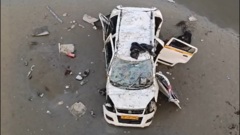Following a fatal accident in Uttar Pradesh linked to Google Maps' navigational errors, discussions around the app's responsibility and India's road infrastructure have emerged. Authorities cite previous incidents indicating a broader concern over the reliability of GPS systems.
Tragic Car Crash in India Raises Questions on Google Maps Accountability

Tragic Car Crash in India Raises Questions on Google Maps Accountability
The death of three men in a car accident has sparked an inquiry into the reliability of Google Maps and its role in navigation errors.
A tragic car accident in Uttar Pradesh, India, has ignited a heated debate about the responsibility of navigation apps like Google Maps in ensuring road safety. The incident, which resulted in the death of three men who were en route to a wedding, occurred when their vehicle veered off an unfinished bridge and plunged onto a riverbed. The police are currently investigating the crash, which has raised questions over whether Google Maps directed the men to the dangerous route.
According to local authorities, a section of the bridge had collapsed earlier in the year due to flooding, a fact well-known to residents but unknown to the three victims who were visiting the area. There were reportedly no warning signs or barricades indicating the bridge's hazardous condition. In response, authorities have filed a police complaint against four engineers from the state road department along with an unnamed official from Google Maps, holding them responsible for culpable homicide.
This tragic event has shone a spotlight on the ongoing issues surrounding India's road infrastructure and the accountability of navigation applications. Critics argue that Google Maps failed to provide accurate information, leading to this fatal accident, while others believe the greater blame lies with governmental authorities for not properly securing such dangers. Google Maps, an essential tool for many in India—boasting around 60 million active users—has often come under fire for inaccuracies that can lead to dangerous situations. Past incidents, including a drowning in a dam and another in which two doctors crashed into a river, underscore concerns about the reliability of GPS-based navigation.
Complicating the matter is how Google Maps updates its data on road conditions. The app relies on user GPS signals to track real-time traffic changes, but without an efficient system for logging infrastructural issues in India, it struggles to maintain accuracy. Ashish Nair, a mapping expert and former Google employee, indicates that without robust government protocols for reporting road issues, navigation inaccuracies are likely to persist.
In the wake of this accident, legal perspectives on GPS app liability are mixed. Advocate Saima Khan explains that under the Information Technology Act, platforms like Google Maps are generally shielded from liability as intermediaries. However, if negligence on the part of the app is established, especially if it failed to rectify known issues, legal accountability may be a possibility.
As the debate continues, the broader implications for digital navigation services in the context of India's infrastructure challenges highlight the need for enhanced data collection and sharing to prevent future tragedies.




















